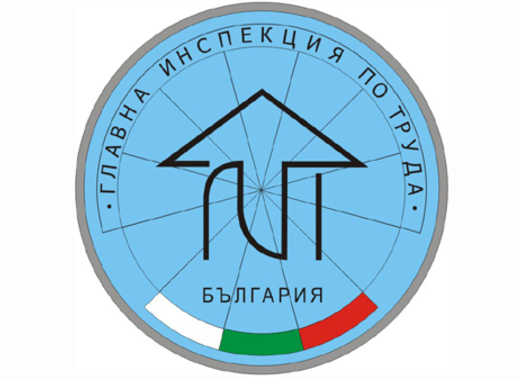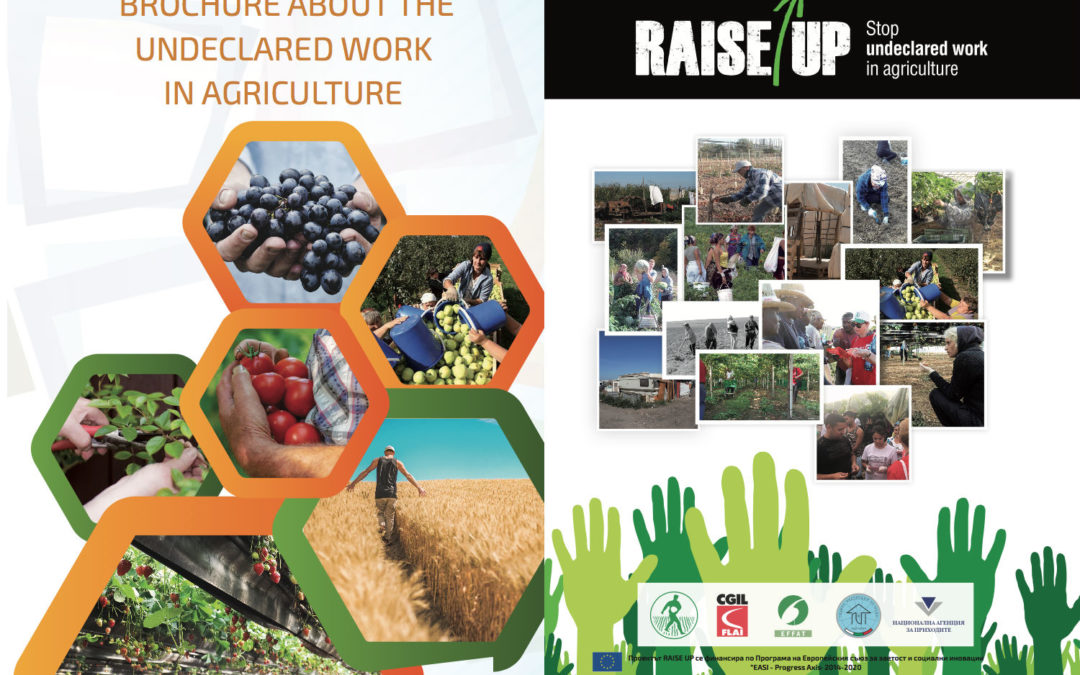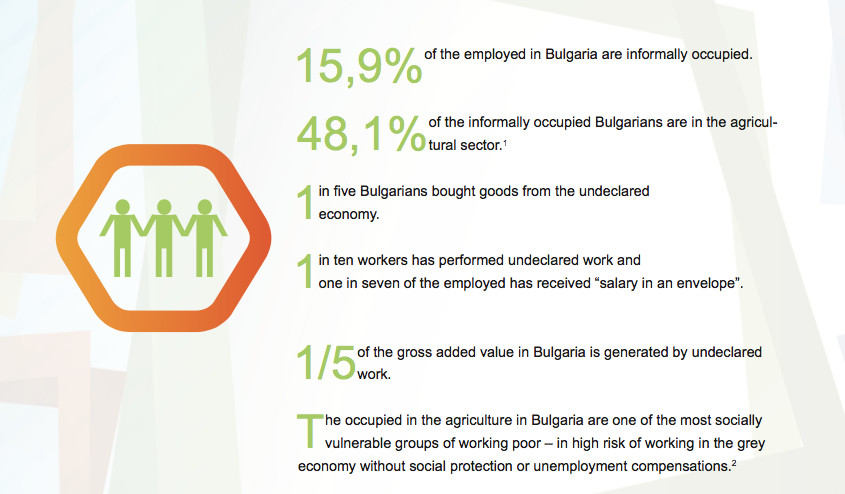
Maggio 2019 | EN News, News, News Raise up
Author: Bulgarian General Labour Inspectorate Executive Agency
Agriculture is a sector that is subject to increased control on an annual basis as the inspections’ data shows that it is at risk with regard to the implementation of unregulated practices in the emergence of employment relationships and the provision of healthy and safe working conditions. GLI EA’s functions for detecting and limiting forms of undeclared work include measures to prevent and impose sanctions on employers, who benefit from undeclared work, and to coordinate between relevant national and European authorities based on agreements and exchange of experience. The most recent statutory form for combating cases of non-employment is the opportunity to conclude a one-day employment contracts.
GLI EA has developed an Automated System (One-Day Labour Contract Portal) that allows farmers to be provided with samples of one-day contracts online. Employers can receive registered samples of labour contracts from the Portal for one-day employment contracts on the website of GLI EA: https://ednodnevni.gli.government.bg/IPSTS/.
By an amendment to the Labour Code, which entered into force on 17 July 2015, registered farmers were given the opportunity to conclude one-day employment contracts for short term seasonal agricultural work with workers, engaged in professions, not requiring special qualifications in the processing of plantations and harvesting fruit, vegetable, rose and lavender. Such contracts are concluded day-to-day and for no more than 90 working days in the calendar year. Amending the Labour Code, promulgated in the State Gazette of May 22, 2018, the one-day employment contracts can also be concluded for 4 hours.
This good practice seeks to limit undeclared work in seasonal agricultural work and to enable employers in the crop farming industry to employ workers more flexibly, including unemployed, socially disadvantaged and non-professional workers. The new legal framework has created clarity and certainty for employed workers as well as for the employers, who can legally employ workers. It has created a legal basis to address the problem of legally hiring the workforce, engaged annually in agricultural activities that require a large number of workers for a short period.
The conclusions from an assessment report on the effectiveness of the introduction of one-day employment contracts, prepared by a Sociological Research Agency, covering the period 16.07.2015-27.09.2016, are the following:
- The implementation of one-day contracts has led to lighter employment in agriculture;
- The scope of one-day contracts is extended by increasing the period of their application and better awareness of employers about the opportunities they provide;
- The recruitment of individuals to one-day contracts includes non-insured persons, which means that this kind of employment is not used to replace another kind of more secure employment;
- One-day contracts have made a significant contribution to employment growth.
Also from the beginning of April 2019 a mechanism/procedure for online declaration of the seconded persons was implemented, in compliance with Art. 9, point 4 of Directive 2014/67/EC according to which “Member States shall ensure that the procedures and formalities relating to the posting of workers pursuant to this Article can be completed in a user-friendly way by undertakings, at a distance and by electronic means as far as possible”.
Other measures and prevention activities against unregulated work include:
– Legislative measures: drafting or amending laws and sub-legislative acts in accordance with the new requirements of the labour market and the new economic realities. New legislation introduced in relation to the regulation of the labour market access for third-country workers, including self-employment and employment of Bulgarian citizens abroad, including their free movement within the European Union and the European Union economic space. Legislative amendments regarding the facilitation of the access to the labour market in Bulgaria of third-country nationals for the purposes of seasonal employment; an intergovernmental agreement for regulating labour migration between Bulgaria and Moldova concluded.
– Institutional measures to create structures and mechanisms for better cooperation between the relevant authorities (General Labour Inspectorate, National Revenue Agency, National Insurance Institute and National Health Insurance Fund, Ministry of Interior, etc.); investing in training and sharing of good practices; conduct joint inspections by institutions, supervising compliance with labour, social security and tax legislation to strengthen the fight against undeclared work and curb the shadow economy as a whole; improving the capacity of the various relevant bodies and participants of the Member States to tackle the cross-border aspects of undeclared work; including cross-border cooperation through IMI, joint inspections and exchange of good practices, within the framework of bilateral agreements; raising public awareness on issues, related to undeclared work, and encouraging Member States to step up their efforts to tackle undeclared work;
– Administrative measures imposing new targeted regimes to regulate the relationship or simplify procedures: Work is not allowed without a registered written employment contract. Registration must be done before the employee starts working for the employer; The Labour Inspection Bodies have the right to declare the existence of the employment relationship, when they find that labour is provided in violation of the law. The decree replaces the employment contract and must be registered. Administrative cooperation through the Internal Market Information System with the competent authorities of the other EU Member States, States party to the Agreement on the European Economic Area or the Swiss Confederation and the cross-border enforcement of financial and administrative penalties and fines, including fees and charges, accruals. Annually the Inspectorate’s Activity Plan focuses on the prevention of the gray economy by means of inspections in small and medium-sized enterprises, where the most commonly used non-regulated practices are found.
– Technological innovations– practices, related to the use of modern information technologies. Developing tools (such as good practice guides, etc.) and evaluating experience with similar tools.


Maggio 2019 | EN News, News Raise up
The network of Quality Agricultural Work was the first and concrete initiative aimed at developing positive actions to fight illegal work and “caporalato” in agriculture.
Introduced by the law 116 of 2014 and subsequently modified by the law 199 of 2016, in order to expand the subjects that can join the network, as well as extend the functions of the Steering Board, the network of Quality Agricultural Work, aims to recognize an ethical and respectful work organization. Joining the network determines that the registered companies are not primarily the object of the controls put in place by the supervisory bodies of the Ministry of Labor and INPS.
Who can join in?
Agricultural companies that meet the following requirements can join the network:
- to have no criminal convictions for violations of labor and social legislation, for crimes against the public administration, crimes against public safety, crimes against the public economy, industry and commerce, crimes against feeling for animals and in matters of income and value added taxes, crimes referred to in articles 600, 601, 602 and 603-bis of the penal code;
- not to have been the recipients, in the last three years, of administrative sanctions, even if not definitive, for violations concerning work, social legislation and compliance with the obligations relating to the payment of taxes and fees;
- be up to date with the payment of social security contributions and insurance premiums;
- apply the collective agreements referred to in article 51 of the legislative decree 15 June 2015, n. 81;
- not to be controlled or connected, pursuant to Article 2359 of the Civil Code, to persons who do not possess the requirements described above;
Can also join the network of Quality Agricultural Work, through the stipulation of special agreements:
- immigration offices;
- local institutions;
- employment centers;
- bilateral bodies set up by employers ‘and workers’ organizations in agriculture;
- the subjects referred to in Article 6 of Legislative Decree 10 September 2003, n. 276;
- can join the network of Quality Agricultural Work, through the stipulation of specific agreements, if they meet the requirements set out in paragraph 1, the employment agencies referred to in Article 4 of Legislative Decree 10 September 2003, n. 276;
- other subjects authorized to carry out brokerage activities pursuant to Article 12 of Legislative Decree 14 September 2015, n. 150.
How does it functions?
The Network of Quality Agricultural Work is supervised by a steering board consisting of:
- a representative of the Ministry of Labor, the Ministry of Agricultural Food and Forestry Policies, the Ministry of Economy and Finance, the Ministry of the Interior, the National Labor Inspectorate, the Revenue Agency, the ANPAL, the INPS and the Conference of Regions and Autonomous Provinces of Trento and Bolzano;
- three representatives of agricultural employees and a representative of workers of agricultural cooperatives and three representatives of employers and self-employed agricultural workers and a representative of the agricultural cooperative associations that signed the CCNL.
The steering board has the following tasks:
- decides on requests for participation in the Network of Quality Agricultural Work within 30 days of presentation;
- excludes from the Network of Quality Agricultural Work agricultural enterprises that lose the requisites foreseen by the standard;
- draws up and updates the list of agricultural enterprises that participate in the Network of Quality Agricultural Work and publishes them on the INPS website;
- formulates proposals to the Ministry of Labor and social policies and to the Ministry of Agricultural, Food and Forestry Policies on Labor and Social Legislation in the Agricultural Sector.
But above all it can carry out constant monitoring of the trend of the agricultural labor market, comparing the number of foreign workers who are employed and the number of foreign workers who are granted clearance for agricultural work.
The steering board also promotes initiatives, with the competent authorities and the social partners, on the following subjects:
- active labor policies;
- contrast to undeclared work and tax evasion;
- organization and management of seasonal labor flows;
- assistance to immigrant foreign workers.
The Network of Quality Agricultural Work can be articulated into territorial sections (based at the CISOA) and promote initiatives at territorial level, in agreement with the competent authorities, on the following subjects:
- active labor policies and combating tax evasion;
- organization and management of seasonal labor flows;
- assistance to immigrant foreign workers;
- intermediation of labor supply/demand in the agricultural sector, in collaboration with the ANPAL and the National Network of services for active labor policies;
- transport of workers to the workplace, also by entering into agreements with local authorities.
Currently there are 3,619 companies that adhere to the Quality Agricultural Work Network (INPS Data updated to 7 March 2019).

Aprile 2019 | EN News, News Raise up
Undeclared work deprives workers of fair payment, social and health insurance, annual leave and other payments, regulated by labour law.
The total number of the people officially paying social contributions in the Bulgarian agriculture sector is 110.605 out of 2.802.989 workers – only 3,95% of all insured people.
Social justice passes through personal awareness, the information that we have access to and the conscious choices we make.

In order to inform, raise knowledge and promote greater awareness of rights, the Bulgarian union FNSZ, member of the Confederation of Independent Trade Unions (CITUB), produced a brochure explaining:
- what is meant by undeclared work;
- which concrete forms it can assume;
- which are the negative consequences it produces for workers, for employers, for the State, for the society;
- which are the causes and which are the factors that contribute to its development;
- which are the measures and actions to prevent its occurrence.
Download it here.
Luglio 2016 | EN News
“Il settore dell’industria alimentare nel cammino verso la strategia Europa 2020: promuovere l’empowerment dei membri dei Comitati aziendali europei (CAE) di Campofrìo e Conserve Italia”
Il 12-13 luglio 2016, a San Lazzaro di Savena (BO), presso la sede di Conserve Italia Soc. Coop. Agricola sita in Via Paolo Poggi, 11, si svolgerà il seminario internazionale relativo al progetto “Il settore dell’industria alimentare nel cammino verso la strategia Europa 2020: promuovere l’empowerment dei membri dei Comitati aziendali europei (CAE) di Campofrìo e Conserve Italia”
(VS/2015/0371).
Il progetto ha messo in atto un’ azione di formazione a distanza, mediante una piattaforma web, in grado di migliorare le conoscenze, abilità e competenze delle parti sociali e degli altri attori a livello aziendale coinvolti nelle attività dei Comitati Aziendali Europei, e di aumentare il loro livello di conoscenza e consapevolezza sulle questioni critiche che riguardano l‘industria alimentare europea e sul contenuto del diritto comunitario in materia di coinvolgimento transnazionale dei dipendenti.
In particolare, il seminario internazionale, rappresenta un’importante occasione per uno scambio di esperienze sui problemi di comunicazione cross-culturale, sul monitoraggio delle performance aziendali, sulla responsabilità sociale delle imprese e sulla gestione di ristrutturazioni, fusioni, acquisizioni e chiusure dell’ attività di impresa.
I membri dei CAE coinvolti saranno in grado di utilizzare i risultati del dibattito per migliorare il contenuto dei loro accordi e di negoziare la futura attività di formazione.
Siete tutti invitati a partecipare.
Per maggiori informazioni e per l’ organizzazione del viaggio siete pregati di contattarci
CONTATTACI





